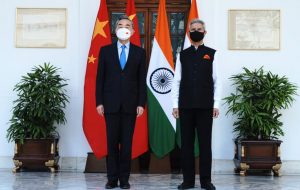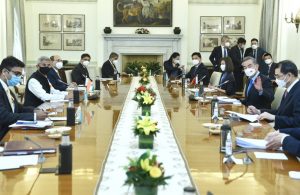
In an unambiguous message to Beijing, India’s External Affairs Minister S. Jaishankar has conveyed to his Chinese counterpart Wang Yi that the restoration of normalcy in bilateral ties will require a restoration of peace and tranquillity on the border and underlined that China needs to expedite disengagement of troops from Ladakh if it’s serious about improving ties with India.
In their first meeting in New Delhi since the killings of Indian soldiers in Ladakh nearly two years ago derailed bilateral ties, the two foreign ministers spoke for three hours to discuss the situation on the border in Ladakh and other regional issues related to Afghanistan and Ukraine.
The overarching focus of the three-hour long discussion was on fast-tracking the disengagement of Chinese troops from disputed areas in Ladakh, with India making improvement in ties contingent on full withdrawal of Chinese troops. “Foreign Minister Wang Yi spoke about China’s desire for a return to normalcy, while also referring to the larger significance of our ties. I was equally forthcoming that India wants a stable and predictable relationship,” said Mr Jaishankar after the talks. “But restoration of normalcy will obviously require a restoration of peace and tranquillity. If we are both committed to improving our ties, then this commitment must find full expression in ongoing disengagement talks,” he stressed.

Alluding to 15 rounds of talks between crops commanders of India and China over the last few months, Mr Jaishankar described the current situation along the Line of Actual Control as “work in progress” and noted that “progress has been achieved on several friction points from the disengagement perspective.” “This needs to be taken forward since the completion of disengagement is necessary for discussions on de-escalation to take place,” he said. “I would describe our current situation as work in progress, obviously at a slower pace than desirable and my discussions with FM Wang Yi today were aimed at expediting the process.”
In his media briefing, Mr Jaishankar underlined many times that peace and tranquillity in the border areas can alone serve as “the foundation of stable and cooperative ties.”
In his interaction with Mr Jaishankar and India’s National Security Adviser Ajit Doval, Wang Yi proposed a three-point approach for normalising relations. “First, both sides should view bilateral relations with a long-term vision. Second, they should see each other’s development with a win-win mentality. Third, both countries should take part in the multilateral process with a cooperative posture.”
Wang Yi’s visit to New Delhi was shrouded in secrecy right till he touched down in New Delhi from Kabul on March 24 night.
The talks between the two foreign ministers signal the desire of the two Asian giants for stable and predictable relations amid geopolitical turmoil triggered by the Russian invasion of Ukraine. The two ministers didn’t set any deadline for disengagement process, but signalled that the issues relating to the process will be given top-level attention.
The Ukraine situation figured prominently in discussions, with the two ministers concurring on the need for diplomacy and dialogue to resolve the crisis.
Outlining India’s principled approach to international relations, based on respect for international law, UN Charter and sovereignty and territorial integrity of states. “Disputes should be resolved without use or threat of use of force. Nor should there be attempts to unilaterally change the status quo,” Jaishankar told Wang Yi. Where India and China are concerned, our relationship is best served by observing the three mutuals – mutual respect, mutual sensitivity and mutual interests, Mr Jaishankar stressed.
Author Profile

- Manish Chand is Founder and Editor-in-Chief of India Writes Network (www.indiawrites.org) and India and World, a pioneering magazine focused on international affairs. He is CEO, Centre for Global India Insights, an India-based think tank focused on global affairs.
Latest entries
 India and the WorldFebruary 17, 2026South-by-South: Focus on people-centric solutions at India AI summit
India and the WorldFebruary 17, 2026South-by-South: Focus on people-centric solutions at India AI summit India and the WorldFebruary 7, 2026Modi hails interim India-US trade deal, Goyal says no concessions made on agriculture
India and the WorldFebruary 7, 2026Modi hails interim India-US trade deal, Goyal says no concessions made on agriculture India and the WorldFebruary 2, 2026Trump announces trade deal with India, Modi ‘delighted’
India and the WorldFebruary 2, 2026Trump announces trade deal with India, Modi ‘delighted’ India and the WorldJanuary 31, 2026Palestinian minister bats for mediatory role for India in ending Gaza conflict
India and the WorldJanuary 31, 2026Palestinian minister bats for mediatory role for India in ending Gaza conflict







